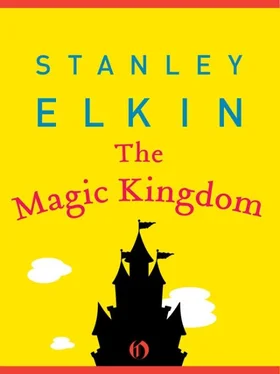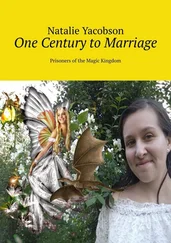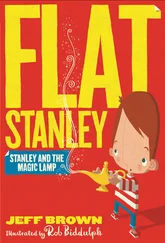He had, after all, some experience in these matters. Liam was eight when his disease was diagnosed and, while he was nervous about his long-term prospects from the first, it wasn’t until he was ten that he suspected he was going to die, and not until he was eleven that he knew he was. And not until those last awful months, Bale remembered, that he actually looked forward to it. His mostly not-forward-looking son.
And that’s the point, isn’t it, Bale thought. That not once in all the four years of his child’s awful disease, or the one or two or of his terrible knowledge, had the boy openly expressed or — or so Bale, who knew the kid, believed — secretly harbored opinions about either the world’s or his own future. At six he’d wanted to be a fireman, a pilot, a singer, a cop. At seven his imagination had briefly entertained the notion of becoming a film star. And at nine he wanted, to the extent that he extrapolated a life at all, simply to grow up. After he knew how ill he was he never mentioned it. As closed to the idea of a future as it to him.
They would go, of course. There had been too much hype about the Magic Kingdom’s new wing for them not to. So they would go. And have twinges, privately or distanced by their bad public jokes. Some fleeting regrets, some reverse nostalgia for the yet-to-be, but not all that stronger, finally, than his own. Bale wasn’t forty yet and, although he expected to live another thirty or thirty-five years, he didn’t believe that even in his lifetime (for the moment forgetting the sixty or sixty-five years his dream- holiday kids would probably have lived had they not become ill) the world’s cities would blossom into those tall, slim, futuristic forms projected by the park’s planners and engineers: cityscapes, Bale thought, like nothing so much as the special effects in science fiction movies, the smooth, permeate Lego acrylics of starships or the capital cities of distant planets, glowing on some night in the future blue as runway lights or the color of water on maps.
But they would go. They’d go — this was hard for Eddy to admit — because there wasn’t that much left for them to do. He supposed they had enjoyed their time at Disney World. He had misgivings — his unclear notion of a busted decorum — but on the whole Bale felt it had been a good visit. What they had for health — Moorhead had chosen wisely — had so far held up, and they all seemed to get along better than anyone had probably had a right to expect. Colin’s hostility had marred the ointment, but that was personal. Otherwise the fellow performed his job conscientiously, as they all did — Eddy had chosen wisely too — and had made no stir in front of the children.
So as far as Eddy was concerned, it wasn’t any abstract anxiety at not being around when the time came for the world to change and put on its new hi-tech face. Posterity did not much trouble them. As much mourn not being on the scene when history happened. As much mourn the Middle Ages, the Renaissance, all the glorious red-letter days one had missed out on, the hour before one was born and time began. Posterity would have its hands full too, even, he suspected, its own incurables. So it wasn’t envy. Envy didn’t stand much chance when the object of the envy was still thirty or thirty-five — he still hadn’t remembered the children’s if-all-had-gone-well sixty or sixty- five — years down the road.
It was the other part about which Bale had his doubts. The World Showcase which made him nervous.
For one, he didn’t think they’d be entertained. With its boutiques and expensive restaurants it was more like some shopping mall than the stage on which one acted out last flings. For another, the pavilions (points-of-interest, highlights like the obligatory views on postal cards — in the Paris street scene Bale spotted, reduced for perspective, the tapered, graceful top of the Eiffel Tower blooming from the roof of the building on which it had been set up like a potted plant — stage set, tableaux, backdrop like a sort of world vaudeville) of the nine represented countries (Canada, the U.K., France, Japan, the U.S., Italy, Germany, China, Mexico) had been built around the shore of a man-made lagoon, and the effect, at least for Eddy, was disconcerting, surreal. Indeed, it was rather like moving in a dream. China was sandwiched in between Mexico and Germany, America between Italy and Japan. Canada just down the road from the U.K. It was, finally, like Heaven. Convenient, about the same size, without obstacle or climate, and laid out like the aisles in a department store. It was like Heaven and it scared him. It would scare the kids too. They would see that there really was a China, that there really was a France. That Germany was not made up. That Italy was no invention, improbable Mexico, unlikely Japan. (All, all real, the scale, toy, gussied-up lands as genuine — wasn’t the evidence of the U.K. pavilion with its High Street and pub, its Tudor and Georgian and Victorian styles, its chimneys and timbers and thatch, or even its costers with their pearly plate like a soft, obsolete armor, proof enough? — as the great engines their tiny models merely stood for. All, all real, alas.) It could put them off. Such knowledge. Reminding them of the simple symbolism of their arrangements, that what they did now had to last them, forcing their hands who should have spent their lives like drunken sailors, like there was no tomorrow. (And speaking of history, Eddy Bale thought, of red-letter days and death at time’s other end like a counterweight, hadn’t Liam himself had a rough go on his birthdays, on Christmas? All holidays, really, those on which no gifts were exchanged as well as those on which they were? Anniversary sodden as bad air. Hadn’t Ginny? Hadn’t Eddy? The presents coming in his boy’s last years not only cardless and unwrapped but unpackaged too, out of their boxes, and, at last, as if they’d been fetched from home in paper bags along with his clean pajamas and his fresh tube of toothpaste. Which would probably outlast him. And queer, he thought, that Liam’s voice had begun to change just a couple of months before he died. Queer. An additional blow. “This is what I would’ve sounded like, ain’t it, Dad?” his son had asked. And Bale had lied. “You’ve a frog in your throat,” he said. “If it’s all right with the doctor, Colin can bring you lozenges for that.” And, terrified, broached the subject of Liam’s puberty with the man. “You’re being silly,” the physician said. “No,” Bale said, “he’s too weak. A wet dream could kill him,” Bale said. And tried to keep up the pretense even after he’d found out that Liam had begun masturbating. Liam dutifully sucking the lozenges Bale brought. Their conversations coated by the vapors of eucalyptus, of cherry and honey and lemon. So that, for Eddy, the effect was that the boy might have come down with nothing more bothersome than a bad sore throat, a seriously stuffed nose. That he slept in a room with a vaporizer, with camphor-coated cloths about his neck. Till the doctor brought Eddy up sharp. “What’s that in his mouth?” “A Hall’s,” Liam said. “Take it out. Don’t you know that menthol could upset your stomach?” But a few weeks had passed. Liam’s voice was changed now. And, Bale hoped, he might have forgotten he ever sounded any different. Till Liam brought him up sharp. “I’ll never have another sore throat, will I?” he said. The anniversaries and special occasions coming thick and fast now. “It’s the full moon tonight. I hope I remember to look at it when they wake me for my medication,” he said. One day, a week or so before he died, he and Ginny, having stepped out into the corridor for a cigarette, returned to the room. Their son was crying. “What is it, Liam? What is it, dear?” “The shipyards are shut down,” he told them. “I heard on the news that the builders have gone out on strike.” They were in a country where no more ships would be built while he lived, he meant. And it was another anniversary of sorts — Liam’s milestone yardage. Because the centennials and jubilees, the birthdays and holidays and seasons were closing in, becoming the monthly and fortnightly and weekly, becoming the daily, all periodicity and fixed interval shrinking through the wide, rotational tidal toward some ever-diminished, diminishing now. Which was about when Colin began to come in to take him to look at the cars down on Devonshire Place. And every day red-letter. Speaking of history.)
Читать дальше












